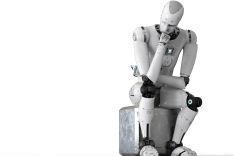Content
Artificial intelligence and intellectual property rights

The future and the artificial Inventor
The extent to which artificial intelligence is patentable was one of the main topics of the AI conference at the DPMA. A number of questions were raised in this context; speakers from the patent system gave competent answers. But there are still many more open questions. One of them is: If artificial intelligence generates new inventions by itself - are they protectable at all?
Protectability of AI
rtificial intelligence methods are mostly mathematical solutions implemented in software, i.e. computer-implemented processes. These are only accessible to patent protection to a limited extent, since computer programs are not patentable. This means that there must be a contribution to the solution of a practical technical problem by technical means, such as the control of an autonomous vehicle.
A technical contribution can also be made if measured data are processed, for example if camera images from a vehicle are analysed to determine which traffic signs can be recognized on them. The same can apply to the evaluation and processing of medical image data for tumor recognition as preparation for a medical diagnosis.
A distinction is usually made between "weak" and "strong" AI. "A weak AI is designed to master practical application problems of human thought", says Dr. Felix Daume, patent examiner at the DPMA. "All systems that we call AI today fall into this category." They can partially imitate human cognitive processes. As examples he cites the recognition and classification of objects in images or speech recognition. "A strong AI, on the other hand, would not be limited to one field of application, i.e. universal intelligence", said Daume.
An example from practical testing: "In my field of testing, the computer-implemented design methods," says Dr. Josef Fleischmann of the DPMA, "there are numerous iterative optimisation methods which can determine an optimum shape for an object, e.g. for a lightweight aircraft component, in terms of weight and load-bearing capacity. In such a case, however, I would not say that the software "invented" this component, but the user who used a computer program as an intelligent tool."
Is "strong AI" possible at all?

A "strong" AI would have to pass the "Turing test" that the brilliant British mathematician and "Enigma" cracker postulated decades ago: If man in communication can no longer tell whether he is talking to a machine or a human - then artificial intelligence is really "strong".
So far there is no "strong" AI. But once an AI has quasi mechanized human thinking, it would be capable of creativity. "But that would also raise the question of the consciousness of the AI," says Daume. And that would open up "a far-reaching legal and ethical problem, such as the question of the legal capacity of the AI or equality with human beings".
AI as a legal subject?
Even the strongest AI could not currently register any protective rights because it would not be a legal subject. So far, the AI is ultimately another tool that inventors use in their work. Property rights can be generated with the help of AI, but only human beings can become applicants and inventors.
But if one day AI becomes so "strong" that it develops a form of consciousness, it could theoretically be recognized as a legal subject. "Only a strong AI could be capable of an act of creation or invention," says Daume. "Depending on the legal status granted to it, such an AI could be both the inventor and the applicant for patent protection.”
Further articles in the AI dossier:
Pictures: iStock.com/AndreyPopov, iStock.com/phonlamaiphoto
Last updated: 19 May 2025

Not only protecting innovations
Social Media